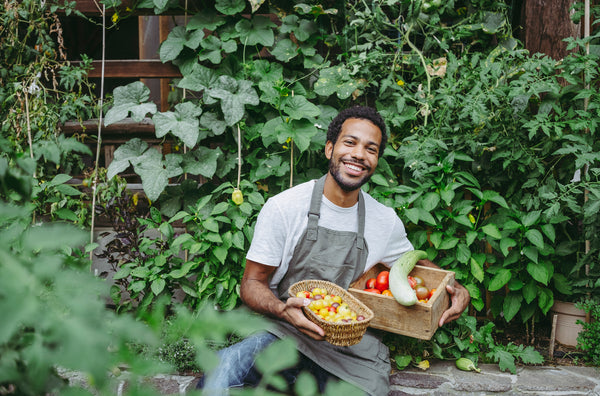Organic Home Gardening: Benefits, Tools, and Easy-to-Grow Produce

Jump to:
If you want a rewarding hobby, and a fun way to bring an abundance of fresh, nutritious produce into your kitchen, creating your own organic home garden is the way to go!
We’d all love to eat more fresh food, more organic food, and make better food choices overall - but the simple fact is, with the cost of living rising, many of us are getting priced out. But nothing’s stopping you from growing it yourself. Not only will you be increasing the quality of your food, but you’ll be promoting a sustainable way of living, and likely even saving a bit of money on your grocery bill.
Being organic gardener allows you to control everything that goes into the soil. You know that pesticides and synthetic fertilizers have not been used, because you’ve made the choice to favor natural, eco-friendly alternatives. It’s great for organic gardeners, for the environment and fantastic for your health.
In addition to the nutrition benefits, the therapeutic process of planting, pruning, weeding, watering, and harvesting can have a lasting effect on your mental health, and many take it as a form of meditation, a way to get some much-needed vitamin D under the sun, and an increasingly rare chance to get a hands-on connection with nature.
Starting a home garden may seem like a herculean task, but with just a little bit of knowledge, an adequate amount of space, and maybe more than a little patience, anyone can enjoy the health benefits of homegrown, organic produce. Whether you’ve got a large yard, a small balcony, or a plot at a communal garden, this guide will help you start the journey of creating your very own, thriving organic organic vegetable garden here.
What is an Organic Home Garden?
An organic home garden is a space where you grow plants without synthetic chemicals, relying on natural processes and materials to nurture soil health and plant growth. Organic gardeners use compost, organic fertilizers, and beneficial insects to enhance soil quality, manage pests, and build a balanced ecosystem.
Organic gardening follows specific rules to maintain its eco-friendly ethos. These rules benefit both plants and the surrounding environment, fostering a sustainable and eco-friendly gardening experience.
-
Avoid synthetic chemicals
-
Build healthy soil
-
Encourage biodiversity
-
Use organic seeds and plants
-
Practice crop rotation and mulching
Further details on essential items and products to avoid are discussed below.
Benefits of Organic Gardening at Home
There are many sustainable farming and gardening methods that each have their stalwart followers, but none are as easy, cost-effective, and beneficial to the home gardener as organic gardening. We briefly touched on many of the benefits of natural gardening in the introduction, but let’s cover each of them with a bit more details.
Healthier Produce
One of the most significant benefits of organic gardening is its positive impact on your health. By choosing to grow only organic plants at home, you’re greatly decreasing your exposure to synthetic pesticides and fertilizers that are commonly found on grocery store produce. Eating fruit, vegetables and herbs that have been kept away from harmful chemicals makes you and your family’s diet healthier and safer.
Environmentally Friendly
Organic gardening encourages the growth and protection of natural ecosystems, by removing harmful chemicals and pollutants that can destroy soil health and kill native wildlife. If you build an organic garden in your yard, you’ll also be building a balanced ecosystem that fosters the growth and development of beneficial soil microbes, and earthworms in the soil, that in-turn increases the quality of your produce. Carving out a little piece of unadulterated nature in your own backyard is a great way to contribute to the overall health of our planet.
Cost-Effective
On average organic food at the grocery store is 47% more expensive than non-organic food, according to Consumer Reports. However, running an organic home garden is typically cheaper than running a non-organic home garden, as the costs of synthetic fertilizers and pesticides can be shockingly high.
A Therapeutic Hobby
Finally, natural gardening is an incredibly rewarding hobby that will have countless, untold benefits to your physical and mental health. Spending time moving and working outside, under the sun, is something that a lot of us are neglecting in the modern world. And tending to plants, weeding, and harvesting produce from organic gardens can be a very therapeutic practice that reduces stress levels, and enhances overall mental health.
Having a direct connection with nature, feeling the difference you’re making to the world, lowering your carbon footprint, and knowing that you’re eating better can create a sense of accomplishment that brings with it bucketloads of joy.
Essentials for Starting an Organic Garden at Home
It can be a very daunting task, but it’s really simpler than it may seem. Assuming you’ve already got a space, a plot, a bed, or some pots (read our How to Start Your Perfect Garden article here for more info).
When you have a space sorted, you just need a few essential materials to start growing your own organic produce at home:
-
Organic garden soil: If you’re filling pots or garden beds you’re going to need soil to start with. Choose soil rich in organic matter, free from pesticides, and enriched with compost or natural fertilizers.
-
Organic seeds: While not necessary–normal seeds are totally fine–organic seeds are bred to perform best in organic environments, and typically come from healthier, stronger plants.
-
Organic mulch: There are many things you can use as a natural mulch: hay, straw, leaves, grass clippings, and so much more.
-
Organic fertilizer: When your plants need a little extra nutrition, fertilizer is the best way to do it. You can buy organic organic fertilizers, or create your own with a compost heap.
-
Organic pest control: It could be as simple as picking the bugs off with your fingers, or you could spring for an organic pest control product such as NEEM oil, or Bacillus thuringiensis.
-
Gardening Tools: Equip yourself with a few essential tools, such as a hoe, a sickle, some shears, a watering can, and some gloves, for easier planting and maintenance.
Products to Avoid
Organic gardening is about what you don’t do, more than what you do. It’s about avoiding harmful products, and choosing not to use chemicals. So you need to be extra careful about the products you use, so that you don’t accidentally use something with chemicals that you should be avoiding.
But more generally, here are most of the key things you should avoid in your organic home garden:
-
Synthetic Pesticides and Herbicides: Organic gardening is natural gardening, so unnatural, synthetic chemicals go against its very ethos. Synthetic pesticides and herbicides can contaminate your soil, kill the beneficial microbes, and coat your produce with harmful residue.
-
Chemical Fertilizers: Chemical fertilizers are the go-to choice to give plants a quick, powerful boost of nutrients, but they disrupt its natural ecosystem, and reduce soil fertility.
-
Treated Wood: Avoid building garden beds out of treated wood, as they are often saturated with chemicals that can leach into your soil. Use untreated wood that is naturally resistant to rot, like cedar, redwood, or mulberry.
-
Non-Biodegradable Mulches: You want to avoid plastic mulch–like the black sheets you often see covering soil–as they can bring harmful microplastics and chemicals into your soil.
Recommended Garden Tools
Gardening, of course, requires gardening tools. While tool choice doesn’t really have an impact on your organic garden, there still are some things to consider. Of course, you should avoid gasoline-powered tools (lawnmowers, strimmers etc.) because of the potential for leak and contamination.
Additionally, if you really care about avoiding microplastics, you should opt for tools with wooden handles. Typically, those who are interested in natural gardening prefer to use more natural, old-fashioned tools. It’s a way to connect with the past, and to connect with nature.
Using gardening tools that were handmade, by traditional craftsmen, further reduces your impact on the environment, as you can be certain they weren’t mass-produced, with excess waste, in polluting factories. It reduces your carbon footprint, and does a little bit extra for the planet.
With these things in mind, here are our top recommended tools (mostly handmade, small workshop, plastic-free) for natural, organic gardening:
1. Hoes
The hoe is one of the oldest agricultural tools still in use. This classic tool is vital for loosening soil, removing weeds, and creating rows for planting. If you have a small garden, a single-handed garden hoe would be the best choice.
2. Mattocks

Mattocks are the best tool for digging through roots, compacted soil, and rocks and rocky earth. If you want to convert a patch of your backyard into a garden bed, a mattock might be just the tool you need to do it.
3. Sickles

You can use sickles for weeding without pesticides, and for harvesting herbs and leafy vegetables. These useful tools make it easy to work in tight spaces, without disturbing your other plants.
4. Garden Forks

A garden fork might be your most-used tool in the day-to-day maintenance of your organic garden. They’re perfect for turning and spreading compost and mulch, which helps to balance the organic matter in your soil. You can also use them to aerate the soil, which is beneficial for root health.
5. Pruning Shears
Pruning shears are necessary for any garden, because more than anything–except maybe watering and weeding–you need to prune fast-growing plants. A good pair of shears can help you trim plants (like these), remove dead leaves, manage healthy growth, and even harvest produce (like these).
5 Easy-to-Grow Produce for Beginners
Starting a small indoor garden is a fantastic way to grow fresh produce year-round, even in limited space. For beginners, we recommend these plants to enjoy quick harvests.
-
Herbs (Basil, Parsley, and Mint): Herbs are compact, require little space, and are versatile in the kitchen. They grow well indoors with direct sunlight and need consistent, moderate watering.
-
Carrots: Smaller carrot varieties are perfect for containers, requiring less space and light (about 4-5 hours daily). Ensure the container is deep enough, at least 12 inches for root growth.
-
Salad Greens (Lettuce, Spinach, and Arugula): Salad greens grow quickly, are shallow-rooted, and only need a container around 2-4 inches deep. They thrive with plenty of sunlight and are easy to harvest by clipping the outer leaves.
-
Radishes: Radishes are fast-growing and suitable for small containers, requiring only about 6-8 hours of sunlight daily. They mature in as little as 30 days.
-
Scallions: Scallions can be regrown easily in a shallow container, offering continuous harvests of green tops. They need moderate light and are very low-maintenance.
Embrace the Joy of Organic Gardening
By building your very own organic home garden, or incorporating organic gardening practices into your existing garden, you can create a thriving ecosystem filled with fresh, healthy, chemical-free produce and all of the microbes beneficial insects and bugs necessary to foster such a space.
By following a few simple practices, such as using organic garden soil, and avoiding harmful chemicals, you can create something that not only has a significant and lasting impact on your physical and mental health, but an impact on the health of this world that we all share.
Connecting with nature, using ancient, natural techniques, and doing it with handmade tools will bring a sense of achievement and satisfaction that will transform you. And the benefits of feeding yourself, and your family, with natural, home-grown, organic and sustainable food will make you shine from the inside out.







0 comments